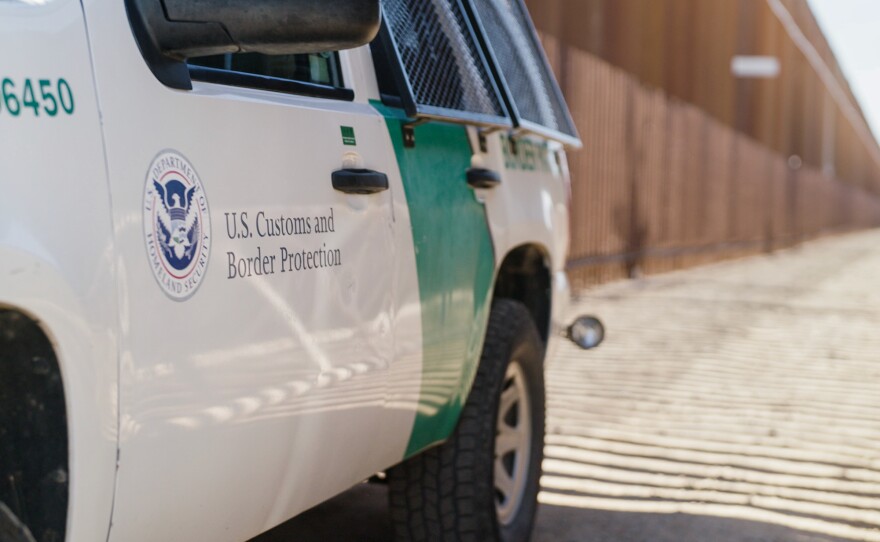This story was originally published by CalMatters. Sign up for their newsletters.
The Department of Homeland Security told a federal court it will retrain more than 900 California-based Border Patrol agents after controversial immigration sweeps in Kern County in January.
The sweeps are the subject of a federal lawsuit against the agencies by the American Civil Liberties Union, which argued that agents targeted people solely for looking Latino or like farmworkers, violating Fourth Amendment protections against arbitrary arrest.
The leader of the Border Patrol’s El Centro sector, which conducted the raids, has maintained that his agents targeted specific people with criminal and deportation histories.
But agents hit targets frequented by day laborers and farmworkers, such as Home Depot, a convenience store and routes to local orchards and farms. Witnesses said people were stopped indiscriminately and asked for their immigration papers.
And a CalMatters investigation, based on U.S. Customs and Border Protection records, found that the agency had no criminal or immigration history on 77 of the 78 people arrested in what was called “Operation Return to Sender.”
“Border Patrol does not admit to wrongdoing in the filing, but it’s also really striking that Border Patrol doesn’t defend its conduct in the filing,” said Bree Bernwanger, a senior staff attorney with the ACLU “We know that their conduct was indefensible. The law doesn’t permit Border Patrol to assume that people are violating immigration law because they’re Brown.”
The ACLU lawsuit was filed on behalf of the United Farm Workers and those detained. It asks a judge to issue an injunction to prevent the Border Patrol from any similar sweeps in California the future.
In court filings, DHS argued the court doesn’t have jurisdiction to review Border Patrol detentions — but also that the ACLU’s claims “have, in any event, been resolved” by new guidelines and training issued to its El Centro sector.
“Accordingly, [Border Patrol]’s prompt, responsive, and demonstrated commitment to forestalling similar alleged violations in the future renders an injunction inappropriate, either as a matter of mootness or lack of a cognizable continued and future irreparable injury,” lawyers for the federal Office of Immigration Litigation wrote.
The Central Valley immigration sweeps appeared to foreshadow the lengths federal agencies would go to fulfill President Donald Trump’s vow to dramatically ramp up immigration enforcement in the United States.
A sworn declaration included with the DHS response, from senior Border Patrol official Sergio Guzman, said agents were issued updated legal guidance on April 4, 2025 prohibiting the El Centro Sector from making warrantless arrests unless they can show both probable cause that someone is in the United States in violation of immigration laws and that the person is likely to flee before a warrant can be obtained. Just being in the U.S. without authorization, the new guidance says, is no longer enough to justify such an arrest. Vehicle stops must be based on “specific, articulable facts,” and agents must document those reasons in formal immigration arrest records.
The federal government said more than 900 agents in the El Centro sector will be trained on the new guidelines, including on how to write reports and how to comply with the Fourth Amendment.
The court documents also say the new guidance is the same as guidelines to follow the law already issued by DHS.
“The law has been the same all along, and in January, we saw that Border Patrol, which obviously should have known what this law is that has been on the books for decades requires, they didn’t and couldn’t follow it,” said Bernwanger. “We really don’t have any meaningful assurance that they’re going to follow the law now.”
“It’s just a pinky swear” said Elizabeth Strater, national vice president at the United Farm Workers. “It’s a policy that could be withdrawn or changed at any time.”
Whatever the outcome of the case, for many people detained or otherwise affected by the January raids, the damage has already been done.
Wilder Munguia Esquivel, 38, a licensed handyman and longtime Bakersfield resident, said in an affidavit filed with the ACLU lawsuit that agents in masks and sunglasses yanked him from a group of day laborers outside a Home Depot. “My first thought was they might be terrorists mugging or kidnapping us. I even wondered if we could be murdered,” he stated. He said he still suffers pain in his arm from the encounter.
Maria Guadalupe Hernandez Espinoza, a 46-year-old greenhouse worker with no criminal record, said in another affidavit that agents forcibly expelled her to Mexico under what they falsely labeled a “voluntary” departure. “My whole life was left in Bakersfield,” she said. “Everything I worked for is in Bakersfield.”
U.S. citizen Ernesto Campos Gutierrez, a 44-year-old landscaper, said he was stopped by armed Border Patrol agents who slashed the tires of his work truck with a knife and refused to explain why he was being detained. “I believe the Border Patrol stopped me solely because of the color of my skin and my appearance,” he said in court filings.
A hearing on the case is set for April 28 in the U.S. District Court in the Eastern District of California in Fresno.







